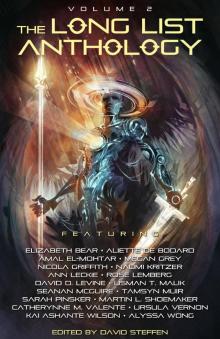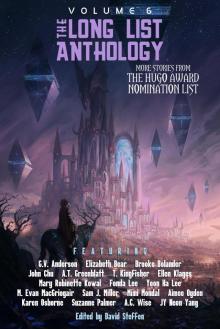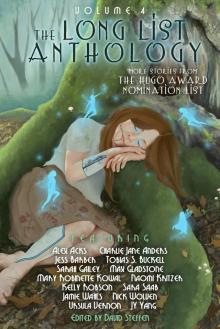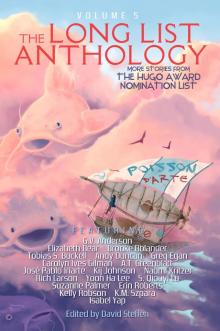- Home
- David Steffen
The Long List Anthology Volume 5
The Long List Anthology Volume 5 Read online
The Long List Anthology
Volume 5
More Stories from the Hugo Award Nomination List
Edited by David Steffen
THE LONG LIST ANTHOLOGY VOLUME 5: More Stories from the Hugo Award Nomination List
edited by David Steffen
www.diabolicalplots.com
Copyright © 2019 David Steffen
Stories copyright © 2018 by the authors
All rights reserved.
Published by Diabolical Plots, L.L.C.
“Worldcon,” “World Science Fiction Society,” “WSFS,” “World Science Fiction Society,” “Hugo Award,” the Hugo Award Logo, and the distinctive design of the Hugo Award trophy rocket are service marks of the World Science Fiction Society, an unincorporated literary society.
Cover art, “Poisson D'Arte” by Amanda Makepeace © 2019
Cover layout by Pat R. Steiner
Layout: Polgarus Studio
To everyone who tries to leave the world a better place than how they found it
Contents
Permissions
Foreword
Mother Tongues • S. Qiouyi Lu
Field Biology of the Wee Fairies • Naomi Kritzer
Meat and Salt and Sparks • Rich Larson
Sour Milk Girls • Erin Roberts
Asphalt, River, Mother, Child • Isabel Yap
The Starship and the Temple Cat • Yoon Ha Lee
Waterbirds • G.V. Anderson
You Can Make a Dinosaur, but You Can't Help Me • K.M. Szpara
And Yet • A.T. Greenblatt
She Still Loves the Dragon • Elizabeth Bear
An Agent of Utopia • Andy Duncan
A Study in Oils • Kelly Robson
The Substance of My Lives, the Accidents of Our Births • José Pablo Iriarte
No Flight Without the Shatter • Brooke Bolander
How to Swallow the Moon • Isabel Yap
A World to Die For • Tobias S. Buckell
Thirty-Three Percent Joe • Suzanne Palmer
The Privilege of the Happy Ending • Kij Johnson
The Nearest • Greg Egan
Umbernight • Carolyn Ives Gilman
Acknowledgments
About the Editor
More From Diabolical Plots Publishing
Permissions
All stories © their respective authors, and reprinted with permission of the author.
“Mother Tongues” by S. Qiouyi Lu. First published in Asimov's January/February 2018.
“Field Biology of the Wee Fairies” by Naomi Kritzer. First published in Apex Magazine, Issue 112.
“Meat and Salt and Sparks” by Rich Larson. First published on Tor.com, June 6, 2018.
“Sour Milk Girls” by Erin Roberts. First published in Clarkesworld, Issue 136.
“Asphalt, River, Mother, Child” by Isabel Yap. First published in Strange Horizons 8 October 2018.
“The Starship and the Temple Cat” by Yoon Ha Lee. First published in Beneath Ceaseless Skies, Issue #244.
“Waterbirds” by G.V. Anderson. First published in Lightspeed Magazine, Issue 98.
“You Can Make a Dinosaur, but You Can't Help Me” by K.M. Szpara. First published in Uncanny Magazine, Issue Twenty-Three.
“And Yet” by A.T. Greenblatt. First published in Uncanny Magazine, Issue Twenty-One.
“She Still Loves the Dragon” by Elizabeth Bear. First published in Uncanny Magazine, Issue Twenty.
“An Agent of Utopia” by Andy Duncan. First published in An Agent of Utopia: New and Selected Stories, published by Small Beer Press.
“A Study in Oils” by Kelly Robson. First published in Clarkesworld, Issue 144.
“The Substance of My Lives, the Accidents of Our Births” by José Pablo Iriarte. First published in Lightspeed Magazine, Issue 92.
“No Flight Without the Shatter” by Brooke Bolander. First published on Tor.com, August 15, 2018.
“How to Swallow the Moon” by Isabel Yap. First published in Uncanny Magazine, Issue Twenty-Five.
“A World to Die For” by Tobias S. Buckell. First published in Clarkesworld, Issue 136.
“Thirty-Three Percent Joe” by Suzanne Palmer. First published in Clarkesworld, Issue 145.
“The Privilege of the Happy Ending” by Kij Johnson. First published in Clarkesworld, Issue 143.
“The Nearest” by Greg Egan. First published on Tor.com, July 19, 2018.
“Umbernight” by Carolyn Ives Gilman. First published in Clarkesworld, Issue 137.
Foreword
Here we are in the fifth volume of the Long List Anthology: More Stories From the Hugo Award Nomination List—that's a half decade of anthologies, and close to a million words of fiction! There are some authors in here that you'll recognize from previous volumes, and some authors that are new to the series.
This year's cover art is “Poisson D'Arte” by Amanda Makepeace, who you may recognize from the cover art for Volume Three and Volume Four. I am very glad to work with her! For these anthologies the artist has very free reign to propose and work up their own design from scratch, and it's so much fun to see how the art turns out.
If you don't follow the Hugo Awards, I suggest that you do—anyone can nominate and vote if you pay for a Supporting Membership to that year's WorldCon. One of the perks of the Supporting Membership is that you get the Hugo Packet, downloadable copies of many of the works on the final ballot. After the Hugo Award ceremony, they also publish a longer list of nominated works, which is the basis of this anthology.
I sincerely hope you enjoy these stories as much as I have!
—David Steffen, December 2019—
Mother Tongues
By S. Qiouyi Lu
“Thank you very much,” you say, concluding the oral portion of the exam. You gather your things and exit back into the brightly lit hallway. Photos line the walls: the Eiffel Tower, the Great Wall of China, Machu Picchu. The sun shines on each destination, the images brimming with wonder. You pause before the Golden Gate Bridge.
“右拐就到了,” the attendant says. You look up. His blond hair is as standardized as his Mandarin, as impeccable as his crisp shirt and tie. You’ve just proven your aptitude in English, but hearing Mandarin still puts you at ease in the way only a mother tongue does. You smile at the attendant, murmuring a brief thanks as you make your way down the hall.
You turn right and enter a consultation room. The room is small but welcoming, potted plants adding a dash of green to the otherwise plain creams and browns of the furniture and walls. A literature rack stands to one side, brochures in all kinds of languages tucked into its pockets, creating a mosaic of sights and symbols. The section just on English boasts multiple flags, names of different varieties overlaid on the designs: US English—Standard. UK English—Received Pronunciation. Singaporean English—Standard. Nigerian English—Standard . . . Emblazoned on every brochure is the logo of the Linguistic Grading Society of America, a round seal with a side view of a head showing the vocal tract.
You pick up a Standard US English brochure and take a seat in one of the middle chairs opposite the mahogany desk that sits before the window. The brochure provides a brief overview of the grading system; your eyes linger on the A-grade description: Speaker engages on a wide variety of topics with ease. (Phonology?) is standard; speaker has a broad vocabulary . . . You take a quick peek at the dictionary on your phone. Phonology-linguistic sound systems. You file the word away to remember later.
The door opens. A woman wearing a blazer and pencil skirt walks in, her heels clacking against the hardwood floor, her curled hair bouncing with every step. You stand to greet her and catch a breath of her perfume.
“Diana Moss,” she says, shaking your hand. Her name tag also displays her job title: Language Broker.
“Jiawen Liu,” you reply. Diana takes a seat across from you; as you sit, you smooth out your skirt, straighten your sleeves.
“Is English all right?” Diana asks. “I can get an interpreter in if you’d prefer to discuss in Mandarin.”
“English is fine,” you reply. You clasp your hands together as you eye Diana’s tablet. She swipes across the screen and taps a few spots, her crimson nails stark against the black barrel of the stylus.
“Great,” she says. “Well, let’s dive right in, shall we? I’m showing that you’ve been in the US for, let’s see, fifteen years now? Wow, that’s quite a while.”
You nod. “Yes.”
“And you used to be an economics professor in China, is that correct?”
You nod again. “Yes.”
“Fantastic,” Diana says. “Just one moment as I load the results; the scores for the oral portion always take a moment to come in . . .”
Your palms are clammy, sweaty; Diana twirls the stylus and you can’t help feeling a little dizzy as you watch. Finally, Diana props the tablet up and turns it toward you.
“I’m pleased to inform you that your English has tested at a C-grade,” she says with a broad smile.
Your heart sinks. Surely there’s been some kind of error, but no, the letter is unmistakable: bright red on the screen, framed with flourishes and underlined with signatures; no doubt the certificate is authentic. Diana’s perfume is too heady now, sickly sweet; the room is too bright, suffocating as the walls shrink in around you.
“I . . .” you say, then take a breath. “I was expecting better.”
“For what it’s worth, your scores on the written and analytical portions of the test were excellent, better than many native speakers of English in the US,” Diana says.
“Then what brought my score down?”
“Our clients are looking for a certain . . . profile of English,” Diana says, apologetic. “If you’re interested in retesting, I can refer you to an accent reduction course—I’ve seen many prospective sellers go through the classes and get recertified at a higher grade.”
She doesn’t mention how much the accent reduction course costs, but from your own research, you know it’s more than you can afford.
“Ms. Liu?” Diana says. She’s holding out a tissue; you accept it and dab at your eyes. “Why don’t you tell me what you’re trying to accomplish? Maybe we can assist you.”
You take in a deep breath as you crumple the tissue into your fist. “My daughter Lillian just got into Stanford, early decision,” you say.
“Congratulations!”
“Yes, but we can’t afford it.” C-grade English sells at only a fraction of A-grade English; you’d rather keep your English than sell it for such a paltry sum that would barely put a dent in textbooks and supplies, never mind tuition and housing.
“There are other tracks you can consider,” Diana says, her voice gentle. “Your daughter can go to a community college, for instance, and then transfer out to Stanford again—”
You shake your head.
“Community colleges in the San Gabriel Valley are among the top in the nation,” Diana continues. “There’s no shame in it.”
You’re unconvinced. What if she can’t transfer out? You and Lillian can’t risk that; a good education at a prestigious school is far too important for securing Lillian’s future. No, better to take this opportunity that’s already been given to her and go with it.
Diana stands and goes over to the literature rack. She flips through a few brochures.
“You know,” Diana says as she strides back to you, “China’s really hot right now—with their new open-door policy, lots of people are (clamoring?) to invest there; I have people calling me all the time, asking if I have A-grade Mandarin.”
She sets a brochure down on the desk and sits back in the executive chair across from you.
“Have you considered selling your Mandarin?”
You trace your hands over the brochure, feeling the embossed logo. China’s flag cascades down to a silhouette of Beijing’s skyline; you read the Simplified characters printed on the brochure, your eyes skimming over them so much more quickly than you skim over English.
“How much?” you ask.
Diana leans in. “A-grade Mandarin is going for as much as $800,000 these days.”
Your heart skips a beat. That would be enough to cover Lillian’s college, with maybe a little bit left over—it’s a tantalizing number. But the thought of going without Mandarin gives you pause: it’s the language you think in, the language that’s close to your heart in the way English is not; it’s more integral to who you are than any foreign tongue. English you could go without—Lillian’s Mandarin is good enough to help you translate your way around what you need—but Mandarin?
“I’m . . . I’m not sure,” you say, setting down the brochure. “Selling my Mandarin . . .”
“It’s a big decision, for sure,” Diana says. She pulls a small, silver case out from the pocket of her blazer and opens it with a click. “But, if you change your mind . . .”
She slides a sleek business card across the table.
“. . . call me.”
• • • •
You decide to go for a week without Mandarin, just to see if you can do it. At times, the transition feels seamless: so many of the people in the San Gabriel Valley are bilingual; you get by fine with only English. Your job as a librarian in the local public library is a little trickier, though; most of your patrons speak English, but a few do not.
You decide to shake your head and send the Mandarin-only speakers over to your coworker, who also speaks Mandarin. But when lunchtime comes around, she sits beside you in the break room and gives you a curious look.
“为什么今天把顾客转给我?” she asks.
You figure that you might as well tell her the truth: “I want to sell my Mandarin. I’m seeing what it would be like without it.”
“卖你的普通话?” she responds, an incredulous look on her face. “神经病!”
You resent being called crazy, even if some part of you wonders if this is a foolish decision. Still, you soldier on for the rest of the week in English. Your coworker isn’t always there to cover for you when there are Mandarin-speaking patrons, and sometimes you break your vow and say a few quick sentences in Mandarin to them. But the rest of the time, you’re strict with yourself.
Conversation between you and Lillian flows smoothly, for the most part. Normally, you speak in a combination of English and Mandarin with her, and she responds mostly in English; when you switch to English-only, Lillian doesn’t seem to notice. On the occasions when she does speak to you in Mandarin, you hold back and respond in English too, your roles reversed.
At ATMs, you choose English instead of Chinese. When you run errands, “thank you” replaces “谢谢.” It’s only until Friday rolls around and you’re grocery shopping with your mother that not speaking in Mandarin becomes an issue.
You’re in the supermarket doing your best to ignore the Chinese characters labeling the produce: so many things that you don’t know the word for in English. But you recognize them by sight, and that’s good enough; all you need is to be able to pick out what you need. If you look at things out of the corner of your eye, squint a little bit, you can pretend to be illiterate in Chinese, pretend to navigate things only by memory instead of language.
You can cheat with your mother a little bit: you know enough Cantonese to have a halting conversation with her, as she knows both Cantonese and Mandarin. But it’s frustrating, your pauses between words lengthy as you try to remember words and tones.
“干吗今天说广东话?” your mother asks in Mandarin. She’s pushing the shopping cart—she insists, even when you offer—and one of the wheels is squeaking. She hunches over the handle, but her eyes are bright.
“Ngo j
iu syut Gwongdungwaa,” you reply in Cantonese. Except it’s not exactly that you want to speak Cantonese; you have to, for now. You don’t know how to capture the nuance of everything you’re going through in Cantonese, either, so you leave it at that. Your mother gives you a look, but she doesn’t bring it up again and indulges you, speaking Cantonese as the two of you go around the supermarket and pile the shopping cart high with produce, meat, and fish.
You load the car with the groceries and help your mother into the passenger seat. As you adjust the mirrors, your mother speaks again.
“你在担心什么?” she asks. Startled, you look over at her. She’s peering at you, scrutinizing you; you can never hide anything from her. Of course she can read the worry on your face, the tension in your posture; of course she knows something’s wrong.
“Ngo jau zou yat go han zungjiu dik kyutding,” you respond, trying to communicate the weight on your shoulders.
“什么决定?” Ma replies.
You can’t find the words to express the choice you have to make in Cantonese. Every time you grasp for the right syllables, they come back in Mandarin; frustrated, you switch back to Mandarin and reply,
“我要用我的普通话来赚钱去送Lillian上大学。”
You expect your mother to scold you, to tell you about the importance of your heritage and language—she’s always been proud of who she is, where she’s from; she’s always been the first to teach you about your own culture—but instead her expression softens, and she puts a hand over yours, her wrinkled skin warm against your skin.
“哎,嘉嘉,没有别的办法吗?”

 The Long List Anthology Volume 2
The Long List Anthology Volume 2 The Long List Anthology Volume 6
The Long List Anthology Volume 6 The Long List Anthology Volume 4
The Long List Anthology Volume 4 The Long List Anthology Volume 5
The Long List Anthology Volume 5